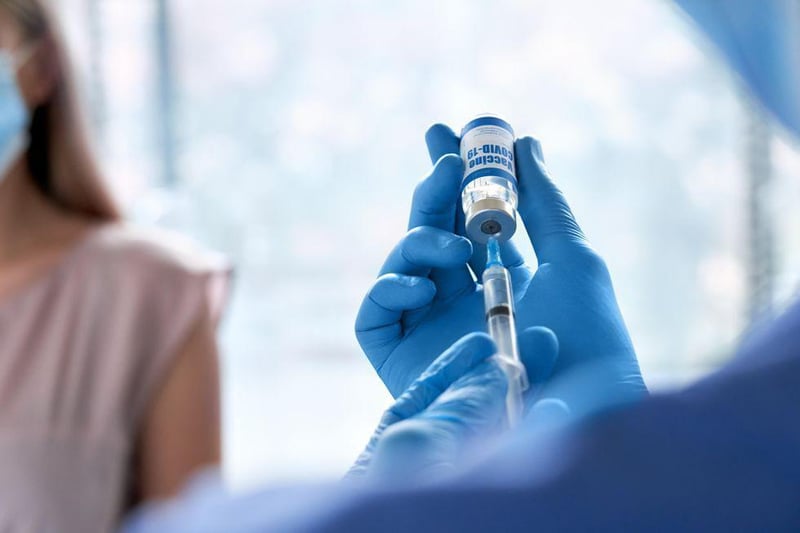We are closed on New Year’s Day, Memorial Day, July 4th, Labor Day, Thanksgiving, and Christmas Day.
Manténgase sano!

- Ernie Mundell and Robert Preidt and Robin Foster
- Posted December 16, 2021
CDC Panel Advises That Other Vaccines Be Preferred Over J&J Shot
Following continued reports of a rare but life-threatening clotting condition linked to the Johnson & Johnson coronavirus vaccine, a federal advisory panel on Thursday recommended that the Pfizer/BioNTech and Moderna shots be the preferred choices for Americans.
The Advisory Committee on Immunization Practices (ACIP), which makes vaccine recommendations to the U.S. Centers for Disease Control and Prevention, voted on Thursday afternoon on "updated recommendations for use" of the single-dose vaccine, according to an agenda of the meeting.
So far, about 16 million people have been fully vaccinated with the J&J vaccine in the United States, compared with about 73 million with Moderna and over 113 million with Pfizer.
The expert panel heard updated information about thrombosis and thrombocytopenia syndrome (TTS), a rare blood clotting condition that has been linked to J&J's vaccine, but not to the Pfizer or Moderna vaccines.
According to the New York Times, evidence has emerged suggesting that the risk from the J&J vaccine of developing TTS, although still exceedingly rare, was larger than originally thought. In total, the CDC reviewed data showing that a total of 54 cases had been reported in people who had received the shot by the end of August. That works out to 3.8 cases per one million people -- still very low, but higher than was originally estimated.
No such risk has emerged for people who received the Moderna or Pfizer vaccines.
At the same time, laboratory studies have suggested that the amount of protection from the vaccine when pitted against the Omicron variant is low, the Times said.
One of the advisory panel members, Dr. Pablo Sanchez, a pediatrician at Ohio State University, said he was already telling patients to get other vaccines.
"I'm not recommending [the J & J vaccine] to any of my patients' parents and I tell them to stay away from it,"he told the Times.
Americans may already be turning away from the vaccine , and most who got the J & J shot originally have not turned to it as a booster.
Some experts stressed, however, that with COVID case numbers surging once again across the United States, it's certainly not the time to say no to any form of vaccine.
"It's really important, though, that we not completely eliminate this vaccine,"Dr. Jason Goldman told the Times. He's a representative of the American College of Physicians and assistant professor of clinical biomedical science at Florida Atlantic University.
The FDA is not obliged to follow the recommendations of its advisory panels, although it usually does. Right now, the J&J vaccine is authorized for use in people 18 and older, and can be used as a booster shot for adults fully vaccinated with the J&J, Pfizer or Moderna vaccines.
But on Tuesday, the FDA weighed in on the vaccine and said that people with a history of TTS should not get the J&J vaccine.
"You should not get the Janssen COVID-19 Vaccine if you had a severe allergic reaction after a previous dose of this vaccine; had a severe allergic reaction to any ingredient of this vaccine; had a blood clot along with a low level of platelets [blood cells that help your body stop bleeding] following Janssen COVID-19 Vaccine or following AstraZeneca's COVID-19 vaccine [not authorized or approved in the United States]," the agency said in an updated fact sheet for vaccine recipients and caregivers.
Clotting issues with the J&J vaccine first surfaced in April, when early reports of TTS drove a short pause in the use of the vaccine. The CDC has continued to monitor TTS cases linked to the vaccine since then.
Both the CDC and the FDA have said people who receive the J&J vaccine -- particularly women younger than 50 -- should watch for symptoms a week or two after a shot that include severe or persistent headaches or blurred vision; shortness of breath; chest pain; leg swelling; persistent abdominal pain; or easy bruising or tiny blood spots under the skin beyond the injection site. If any of those symptoms develop, people should seek medical care immediately.
Jake Sargent, a spokesman for Johnson & Johnson, told the Washington Post that the company's updated fact sheet includes the latest information from the FDA about the rare condition.
"We are committed to understanding and communicating all known risks, including rare events of [the blood clot condition], and strongly support raising awareness of the signs and symptoms of this rare event,"he said.
More information
Visit the U.S. Centers for Disease Control and Prevention for more on the J&J vaccine's safety profile.





